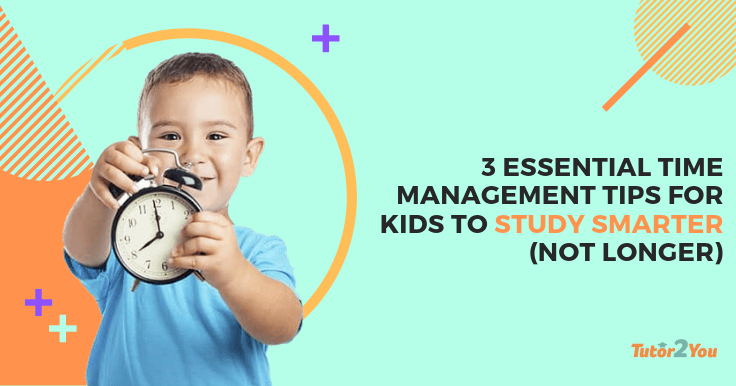
3 Essential Time Management Tips For Kids To Study Smarter (Not Longer)
It is essential to maintain an overall perspective of where the kids are at any given point in the term. They need to be aware of what deadlines and milestones are coming up.
Just as it’s important to have a long-term view, it’s also important to chunk out time. This is a highly effective time management strategy.
"If you want real productivity and their study to stick in their mind, block out time to focus on one thing at a time, as part of their bigger plan."
These are some of the activities that you might consider when helping your child manage their time
- Preparing for an exam
- Doing a school project
- Organising notes
- Doing homework
- Going to family events
- Social gatherings
- Playing sports
- Exercising
- Eating
Give it a time to wrap up the personal and social activities you have for the week. Use the Ultimate Weekly Planner designed by Tutor2you to plan for the coming weeks visually.
The calendar should contain all significant dates, including exam dates, homework, project deadlines, term breaks, holidays etc. It is important to build strong habits over time, so it is advisable to review what you and your child have written on the planner every end of the day or regularly.
Take note of these 3 essential tips to improve your child's time management.
1. Help your child manage their tasks
A human brain learns academic material faster and better if done in short blocks of time spread out over a more extended period.
If you were training for a marathon, you wouldn't try and run 24 hours a day. This means that they'll perform better on the exam if they spend one hour studying each day for twenty days than if they spend ten hours studying for two days before an exam.
Therefore, break down major tasks into small parts.
Aside from following their teacher’s deadline, you need also to teach them how to set a deadline for themselves. Manage how long the task is likely to take them to plan the week around. Always check their calendar and ensure that they have scheduled everything.
2. Allow contingency time
Plan for a small amount of contingency time before and after each task. It also allows for short breaks, which can be very helpful for refreshing the kids' mind and boosting productivity.
3. Know your limits
Make sure to be clear on what they need to achieve each week. Do urgent and important tasks first and re-prioritise others that you think they can’t commit to. Do not focus on tasks that are not possible for them to finish within the given day or week. Make necessary adjustments as much as possible. After all, they can only do what is humanly possible.
SAMPLE ROUTINE CHART FOR KIDS
Breaking down a study time into smaller chunks will help your child retain information better.
Do the hard stuff first. It’s natural for kids to procrastinate on difficult tasks, but encouraging them to tackle the hard stuff first will make the rest of their studying more enjoyable.



Let us help your child develop their planning and organisational skills
If you would like help from one of our trained and certified tutors why not click here and enquire today.


